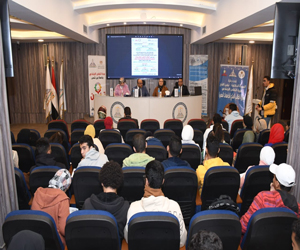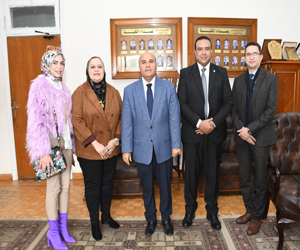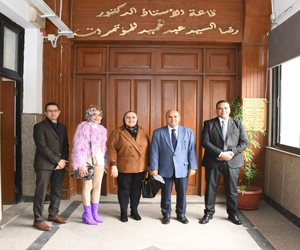A seminar on the legal system for medium, small, and micro enterprises within the Productive Student Initiative at the Faculty of Law
Within the framework of the state’s support with all its institutions for medium, small and micro projects because of their impact on the development of the national economy and within the framework of Ain Shams University’s keenness to support the productive student initiative, the Community Service and Environmental Development Affairs Sector and the Social Solidarity Unit at the university organized in cooperation with the Faculty of Law and the Higher Counseling and Review Center A symposium entitled “The Legal System for Medium, Small and Micro Enterprises” within the Productive Student Initiative, under the auspices of Dr. Neven Al-Qabbash, Minister of Social Solidarity, and Prof. Mohamed Diaa Zein Al-Abedeen, President of Ain Shams University, and Prof. Ghada Farouk, Vice President of the University for Community Service and Environmental Development Affairs, and Prof. Salah Hashem, Advisor to the Ministry of Social Solidarity, General Coordinator of Social Solidarity Units in Universities.
The symposium was opened by Prof. Mohamed Safi, Dean of the Faculty of Law, and Prof. Gehan Ragab, Advisor to the Vice President of the University for Community Service and Environmental Development Affairs, in the presence of Prof. Ahmed Dehoum, Vice Dean of the College of Law for Community Service and Environmental Development Affairs, and Dr. Ahmed Selim, Director of the Financial Consulting and Auditing Center, and the symposium was lectured by Dr. Nihal Attia, lecturer in the Department of Commercial and Maritime Law at the college.
During the speech of Prof. Mohamed Safi, stressed the importance of the role of medium, small, and micro enterprises in developing the national economy, creating job opportunities, and meeting a number of society’s needs, praising the university’s role in developing students’ capabilities and qualifying them to engage in the labor market and providing distinguished small projects that serve the community, explaining the importance of integrating medium, small and micro enterprises in the state’s economy within an appropriate legal framework.
Prof. Gehan Ragab said that the symposium comes within the activities of the Social Solidarity Unit, which presents the projects of the Productive Student Initiative, which was launched by Ain Shams University within the protocol concluded between the Ministry of Social Solidarity and Ain Shams University - Community Service and Environmental Development Affairs Sector, and this comes within the framework of the government launching many initiatives. The official government aims to facilitate ensuring that these projects obtain financing, with the aim of providing job opportunities, raising the volume of growth and growth rates of the domestic product, achieving an increase in production capacity, attracting new classes of investors, and offering various products and services that meet consumer needs, which reflects positively on the economic situation in the country.
Prof. Ahmed Salim talked about several seminars and workshops organized by the Material Consulting and Review Center to support the student initiative, with the aim of training students on the requirements for working on small projects, including how to conduct a feasibility study for projects, how to generate innovative ideas, and other training courses in that regard.
I also borrowed a. Aya Wanis, head of the social solidarity unit at the university, the unit’s goals are to provide services to students in various fields, such as paying students’ fees or providing compensatory devices to students with disabilities, and the role of the Productive Student Initiative in helping students make their small projects successful.
The symposium was lectured by Dr. Nehal Attia on the legal system for medium, small, and micro enterprises and reviewed the history of the development of commercial laws from the 1950s until the law of 2020.
She explained the companies and their types, such as “solidarity companies, joint-stock companies, clearing companies, personal companies, one-person companies, and others,” explaining the differences between them. It also provided an explanation of some of the main points discussed by Law No. 152 of 2020 regarding medium, small, and micro enterprises, the most important objectives of which are the following:
1- Establishing rules and procedures related to facilitating the availability of financing through temporary allocation to medium, small, and micro projects.
2- Regulating the usufruct right over real estate allocated for the purposes of these projects, and the usufruct right is mortgaged to guarantee the financing of these projects.
3- Organizing tax and non-tax incentives to encourage this type of project.
4- Regulating the incentives of companies and establishments that support these projects and the obstacles to enjoying those incentives.
The symposium also clarified the various forms of commercial companies stipulated in the Egyptian Commercial Law, as the project must take one of these forms when established, and the procedures followed to establish these companies were also discussed.
In conclusion, there was a dialogue with the students to answer their legal inquiries related to establishing these projects.
 |
 |
 |
||


.svg)




